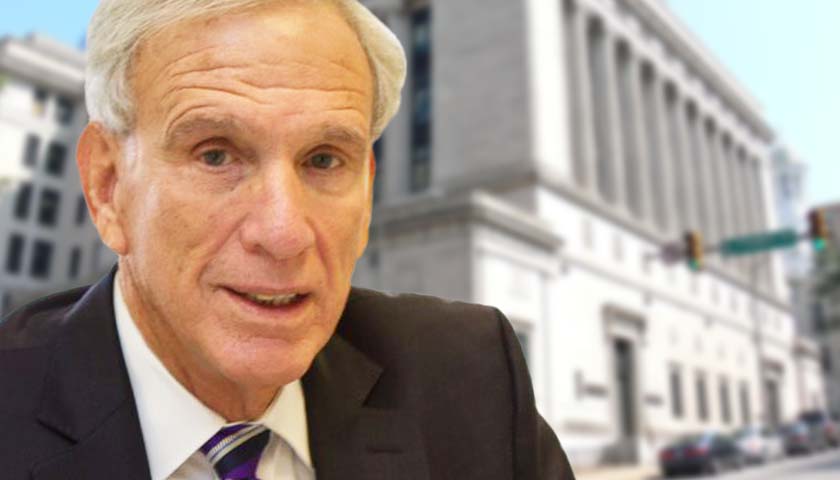The Virginia Redistricting Commission ended two weeks ago when the commission adjourned without formally ending the process. On Monday, a final deadline to complete congressional maps passed without any updates from the commission. According to the constitutional amendment passed by voters, that sends the process to the Virginia Supreme Court. The court will vote on special masters who will work together to create redistricting plans for both congressional and legislative maps. Each General Assembly caucus proposed three nominees, and the court will pick one from each party.
On Monday, Senate Majority Leader Richard Saslaw (D-Fairfax) sent a letter to the court saying that the Republican nominees have “disqualifying conflicts of interest.”
“We do not send this letter lightly, but these three nominees cannot lawfully serve and their mere nomination undermines public confidence in these critical, once-a-decade proceedings to redraw Virginia’s electoral maps. This is the first opportunity this Court has to apply the Redistricting Amendment and draw fair, nonpartisan maps, and the precedent set now will govern future redistricting cycles in the event of Commission deadlocks,” Saslaw wrote.
Virginia Senate Republican Caucus Press Secretary Jeff Ryer told The Virginia Star, “This is a totally undignified and inappropriate effort by one branch to influence and intrude on the prerogative of a co-equal branch. They are trying to exclude qualified demographers and statisticians who, as professionals, routinely draw maps for legislatures, commissions, and courts. The Democrats are seeking to gain an unfair partisan advantage by silencing the perspectives of other qualified experts.”
Republicans nominated Thomas Bryan, who has experience as a statistician with the United States Census Bureau and who founded Richmond-based consulting firm BryanGeoDemographics. They also nominated National Republican Redistricting Trust (NRRT) Executive Director Adam Kincaid. Their third nominee is Texas Legislative Council Legislative Analyst Adam Foltz, who served as primary redistricting map drawer of the Wisconsin State Assembly Republican Caucus during 2011 and 2012.
In his letter, Saslaw highlighted Kincaid’s current role in the NRRT, Bryan’s ties as a consultant to the Virginia Senate Republicans, and Foltz’s role in Wisconsin’s redistricting efforts.
“A federal court found that Mr. Foltz’s sworn testimony about his maps was not credible and indeed ‘almost laughable,‘ and that his maps illegally ‘cracked’ Wisconsin’s Latino population in violation of the Voting Rights Act,” Saslaw wrote.
Ryer challenged the impartiality of the Democrats’ nominees in comments to The Richmond-Times Dispatch, saying, “They’re all college professors. Can you name another profession in this country that has a higher level of support for the Democratic Party?”
Democrats nominated University of California, Irvine Professor of Political Science Bernard Grofman, who served as special master to Virginia courts in 2015 and 2018. They nominated Stanford Law School Professor Nathaniel Persily, author of Solutions to Polarization. Their third nominee is Stanford University Professor Bruce Cain, who served as a special master in Arizona and was a redistricting consultant to the Attorney General of Maryland.
The battle over special masters nominees is similar to the redistricting commission’s battle over map-drawers. Democrats led the charge on hiring one nonpartisan map-drawing team, but Republicans pushed for hiring two partisan teams, expressing concern about institutional bias within the nonpartisan team.
In his letter to the Court, Saslaw asked that Republicans be told to submit new nominees.
“Neither side,” Ryer told The Times-Dispatch, “is going to put forward individuals that they think are not going to do a fantastic job for them.”
– – –
Eric Burk is a reporter at The Virginia Star and The Star News Network. Email tips to [email protected].
Photo “Richard Saslaw” by Bc979. CC BY-SA 4.0. Background Photo “Supreme Court of Virginia” by Morgan Riley. CC BY 3.0.





Early on I was told by someone involved in the process that it would be the Democrat game plan to put redistricting before the Supreme Court as she thought the court is biased toward the Democrat viewpoint.
The conundrum is this is the ultimate political question so it will always be impossible to convene an un-biased committee AND allow for fair, even-handed compromise.
That mechanism does not exist at this time.
Just what We the People want: unelected Judges deciding how we will be represented in the future in OUR government. I have always said: You can’t remove politics from a political process. The Commission was nothing but a joke. At least with gerrymandering, the deciders actually are VOTED INTO OFFICE by the People. And, over the many decades, gerrymandering has not kept only one Party in office; we’ve had different parties in leadership throughout our State history (although not Conservatives often enough!).